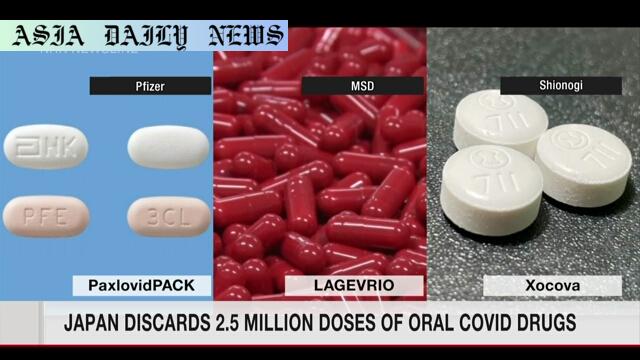expired drugs – Japan’s health ministry disposes of oral COVID-19 meds for 2.5M people after expiry due to market supply challenges.

Introduction
In a strategic yet challenging decision, the Japanese health ministry recently announced the disposal of expired oral COVID-19 drugs meant to treat approximately 2.5 million people. This move has sparked a public and medical debate, as the disposal highlights the challenges in balancing emergency preparedness with effective resource utilization. The government justified the purchase of these drugs during the initial stages of the pandemic, stating it aimed to ensure widespread access at a time when global supply was limited. However, as those drugs exceeded their expiration dates, officials opted to discard them instead of continuing free distribution, amid concerns about market impacts.
The Lifecycle of COVID-19 Medications
At the height of the pandemic, Japan’s government procured three key drugs—PaxlovidPACK, Lagevrio, and Xocova—to combat COVID-19 effectively. These drugs were provided free of cost to hospitals and pharmacies under a special anti-virus law. The stockpile was meant to cover the needs of 5.6 million people. However, with evolving medical priorities and the pandemic easing its grip, the usage of these drugs declined significantly. By May 2023, when COVID-19 was officially downgraded to the same status as seasonal influenza, stockpiles of these unused medications began raising concerns about wasted resources.
Why the Disposal?
The health ministry explained that the decision to dispose of expired drugs was not taken lightly. Despite exploring potential uses for the remaining stock, officials concluded that continued free distribution could disrupt the pharmaceutical market’s stability. Additionally, the expired drugs posed a public health risk if not managed properly. Among the discarded drugs, the disposal included PaxlovidPACK for 1.75 million people and Lagevrio for 780,000 individuals, with Xocova’s stockpile planned for disposal by mid-2024.
Lessons from the Pandemic
Japan’s experience demonstrates the complexities of emergency preparedness during unprecedented global crises. While securing sufficient treatment stockpiles was crucial during the pandemic’s peak, maintaining a balance between market impact, public health needs, and wastage prevention is a delicate endeavor. The health ministry has acknowledged this and expressed its commitment to refining strategies to avoid similar outcomes in the future. Developing flexible procurement systems, better forecasting of drug demand, and perhaps extending shelf-life assessments for future medications could help mitigate such challenges moving forward.
The Broader Implications
The disposal of such a vast quantity of medication also signals a need for international collaboration. Other nations might face similar situations, and sharing strategies, innovations, and lessons learned could enhance global response preparedness. Japan’s case raises broader questions: how can governments better anticipate expiration timelines during pandemics? Could partnerships with pharmaceutical companies ensure unused medications are allocated to areas with shortages before their expiry? These are pressing concerns that require collective solutions from international bodies and health organizations.
Conclusion
The disposal of oral COVID-19 medications by Japan’s government represents an intersection of public health priorities, pharmaceutical market dynamics, and global crisis response strategies. While the decision reflects a pragmatic approach, it also underscores the need for proactive systems to prevent waste in future health emergencies. Governments worldwide can learn from this situation to better navigate the delicate balancing act of ample preparation and sustainable resource management.
Commentary
A Cautionary Tale of Resource Management
The decision by Japan’s health ministry to dispose of COVID-19 oral medications for approximately 2.5 million individuals sheds light on the complex balance required in managing resources during global health emergencies. While the rationale for discarding expired drugs is clear—public health safety and market dynamics—it serves as a stark reminder of the importance of robust planning and adaptive strategies in times of crisis.
The Inevitability of Expiry
One cannot overlook the inevitability of expiration dates when stockpiling medications for a pandemic. With demand for COVID-19 treatments significantly reduced after the virus was reclassified, large portions of these drugs were left unused. In hindsight, this situation pushes us to question whether governments and pharmaceutical companies could have collaborated more effectively to donate surplus or near-expiry drugs to nations in need.
The Ethical Obligation
The ethical considerations surrounding the disposal of such valuable resources cannot be ignored. Could these medications have been used in clinical research or donated before they expired? These questions are worth exploring to ensure that no strategic move results in preventable wastage. Enhanced international collaborations and real-time inventory assessments could become groundbreaking in preventing such situations in the future.
Global Reflections
Japan is not alone in facing such dilemmas. Many nations with stockpiles of COVID-19 vaccines and medications are grappling with similar challenges. The global health community must converge to devise sustainable frameworks for addressing surplus medicine and resource allocation during emergencies. Ultimately, Japan’s experience offers a valuable lesson: managing emergencies demands not just swift actions but also foresight and flexibility.


